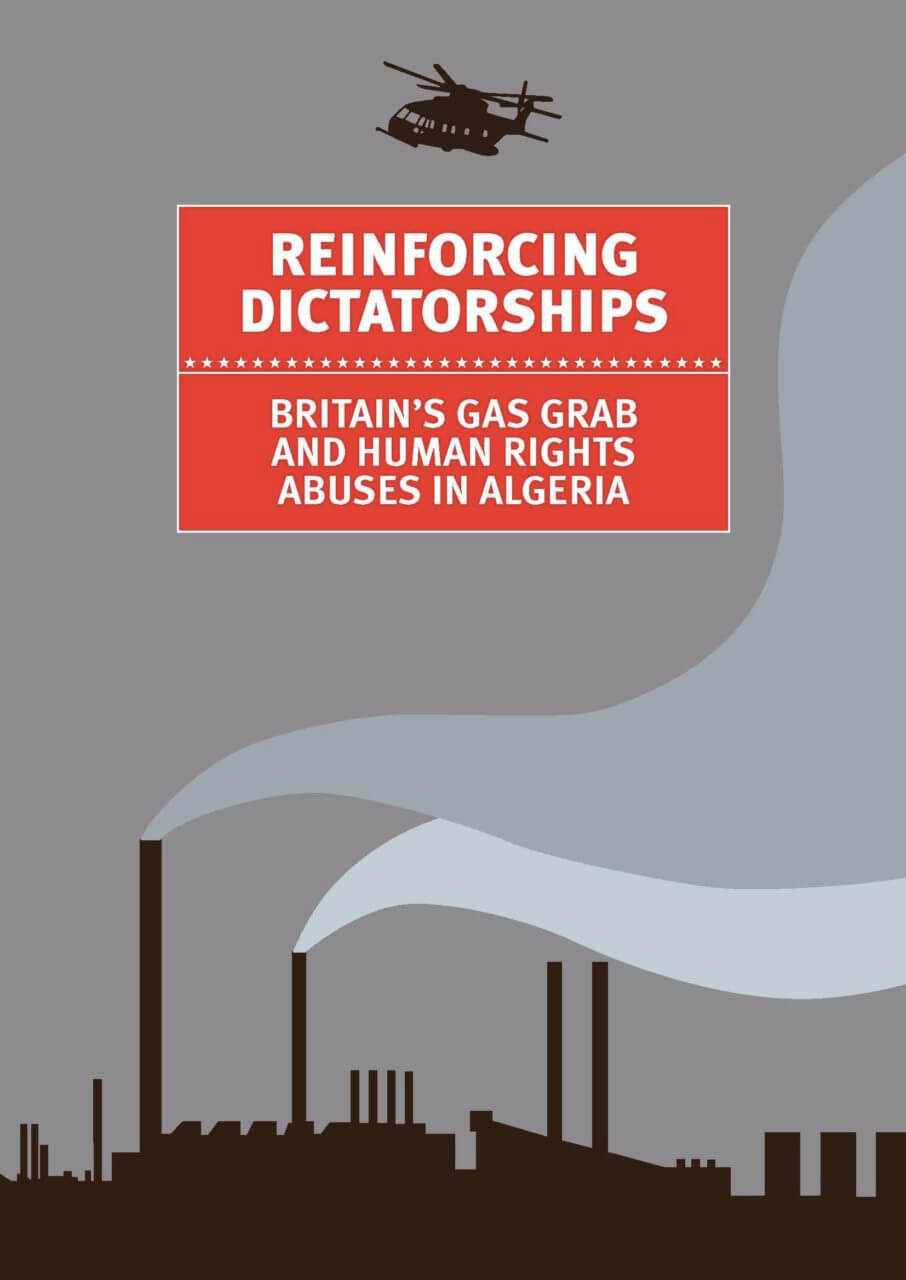
A guest blog from Hamza Hamouchene of the Algeria Solidarity Campaign and author of our newly published report Reinforcing Dictatorships – Britain’s Grab and Human Rights in Algeria.
After more than six months of researching and documenting the British energy interests in my country Algeria, I feel extremely happy that the Algerian-British relations came under scrutiny from the media (a brilliant article in the Guardian) and from several civil society groups such as Algeria Solidarity Campaign , Platform and Campaign Against Arms Trade, which released a highly critical report documenting British collusion with the Algerian authoritarian regime. Moreover, the protest that was held at the London Stock Exchange at a major investment conference: The Algeria Investor Window 2014, demonstrated that “a business first” approach that turns a blind eye to human rights abuses and crushing of democracy cannot go unchallenged.
The fruit of our research and campaigning is a solid briefing entitled Reinforcing Dictatorships – Britain’s Grab and Human Rights in Algeria, released yesterday, arguing that British foreign policy towards Algeria has been shaped by fossil fuel and arms interests and that the UK is pursuing a “gas grab”, in which supplies are locked into the British grid, regardless of consequences for Algerians.
The British Ambassador to Algeria Martyn Roper, who obviously defends the economic and geopolitical interests of the UK tweeted:
UK needs to diversify gas imports and #Algeria using its natural resources for development. Ideal partnership? Talk of ‘UK gas grab’ odd.
— Martyn Roper (@martynroper) February 10, 2014
It is precisely this kind of unethical approach of doing business: an approach that ignores people’s struggles and aspirations to freedom, justice and democracy that many campaigners, journalists, intellectuals and artists worldwide have been challenging and fighting against for decades.
 Of course, this is an “ideal partnership” when it comes to business stripped of morality, and supports the perspective that the UK’s rhetoric on promoting human rights and democracy is somewhat vacuous and hypocritical. If anything, the British authorities are showing their contempt of democratic movements all over the world in the name of doing business and forcing their agenda.
Of course, this is an “ideal partnership” when it comes to business stripped of morality, and supports the perspective that the UK’s rhetoric on promoting human rights and democracy is somewhat vacuous and hypocritical. If anything, the British authorities are showing their contempt of democratic movements all over the world in the name of doing business and forcing their agenda.
By pushing for long-term exports of gas in a context where the Algerian public is excluded from decision-making and benefits are largely reserved for the regime elite, Britain is pursuing a “gas grab”.
It is even more so because the British establishment is willingly engaging with a mafia-like regime whose modus operandi is endemic corruption and the siphoning off of much of the oil and gas rent. Corruption scandals have become routine in Algerian politics in the last few years and multinationals often contribute to this dismal state of affairs. Martyn Roper, when talking about an ideal partnership is showing his disdain for the aspirations of the Algerian people and demonstrating the primacy of British interests over democratic principles.
The UK’s efforts to befriend a violent and repressive regime are not unique to Algeria. British foreign energy policy is marked by repeated collusion with dictatorships and ruthless governments in order to secure certain energy and geopolitical interests, in countries including Bahrain, Saudi Arabia, Angola, Azerbaijan and Nigeria. In Algeria, the UK’s and EU’s desire to lock in greater gas reserves lead them to endorse the silencing and disenfranchisement of a people.
This disgraceful politics is being challenged and will continue to be, thanks to the commitment of so many to human rights and democratic principles. I am heartened with all the support we received for this ongoing campaign and also humbled by all the hard work of the dedicated people around me, within Algeria Solidarity Campaign and Platform who made a small victory today, but nevertheless a significant one, which sends a strong message to the British government that business as usual that goes against people’s rights will be resisted.